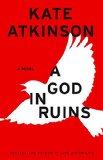Summary | Excerpt | Reviews | Beyond the Book | Readalikes | Genres & Themes | Author Bio

A Todd Family Novel
by Kate Atkinson
Before he could stop himself— the armour of good manners falling away— he said, "It's disgusting to eat a lark, Aunt Izzie."
"Why is it disgusting? You eat chicken and so on, don't you? What's the difference, after all?" Izzie had driven an ambulance in the Great War. Dead poultry could do little to ruffle her emotions.
A world of difference, Teddy thought, although he couldn't help but wonder what a lark would taste like. Thankfully, he was distracted from this thought by Trixie barking extravagantly at something. He bent down to investigate. "Oh, look, a slow worm," he said appreciatively to himself, the lark temporarily forgotten. He picked it up gently in both hands and displayed it to Izzie.
"A snake?" she said, grimacing, snakes apparently having no charms for her.
"No, a slow worm," Teddy said. "Not a snake. Not a worm either. It's a lizard actually." Its bronze-gold-lustred scales gleamed in the sun. This was beauty too. Was there anything in nature that wasn't? Even a slug demanded a certain salutation, although not from his mother.
"What a funny little boy you are," Izzie said.
Teddy didn't consider himself to be a "little" boy. He supposed his aunt— his father's youngest sister— knew less about children than she did about animals. He had no idea why she had kidnapped him. It was a Saturday, after lunch, and he had been mooching around in the garden, making paper planes with Jimmy, when Izzie had swooped on him and cajoled him into going for a walk with her in "the countryside," by which she seemed to mean the lane that ran from Fox Corner to the railway station, hardly nature wild in rock and river. "A little adventure. And a chat. Wouldn't that be fun?" Now he found himself hostage to her whims as she wandered along, asking him strange questions— "Have you ever eaten a worm? Do you play at cowboys and Indians? What do you want to be when you grow up?" (No. Yes. A train driver.)
Carefully, he placed the slow worm back in the grass and to make up for her failure with the skylark he offered Izzie the bluebells. "We have to cross the field to get to the wood," he said, looking doubtfully at her shoes. They appeared to be made of alligator skin and were dyed a rather lurid green that no self-respecting alligator would have admitted to. They were brand new and clearly not meant for tramping across fields. It was late afternoon and the dairy herd, whose field it was, was mercifully absent. The cows, huge baggy things with soft inquisitive eyes, would not have known what to make of Izzie.
She ripped a sleeve climbing over the stile and then managed to plunge one of her alligator-clad feet into a cow pat that would have been quite obvious to anyone else. She redeemed herself a little in Teddy's eyes by being admirably and carelessly cheerful about both mishaps. ("I expect," his mother said later, "that she will simply throw the offending articles away.")
She was, however, disappointingly unimpressed by the bluebells. At Fox Corner the annual exhibition was greeted with the same reverence that others accorded the Great Masters. Visitors were trooped proudly out to the wood to admire the seemingly endless blur of blue. "Wordsworth had his daffodils," Sylvie said, "we have our bluebells." They weren't their bluebells, not at all, but his mother's character was inclined to ownership.
Walking back along the lane Teddy felt a sudden unexpected tremor in his breast, a kind of exaltation of the heart. The memory of the lark's song and the sharp green smell of the great bouquet of bluebells that he had picked for his mother combined to make a pure moment of intoxication, a euphoria that seemed to indicate that all the mysteries were about to be revealed. ("There's a world of light," his sister Ursula said. "But we can't see it for the darkness." "Our little Manichean," Hugh said fondly.)
Excerpted from the book A God in Ruins by Kate Atkinson. Copyright © 2015 by Kate Atkinson. Reprinted with permission of Little, Brown and Company.
Your guide toexceptional books
BookBrowse seeks out and recommends the best in contemporary fiction and nonfiction—books that not only engage and entertain but also deepen our understanding of ourselves and the world around us.